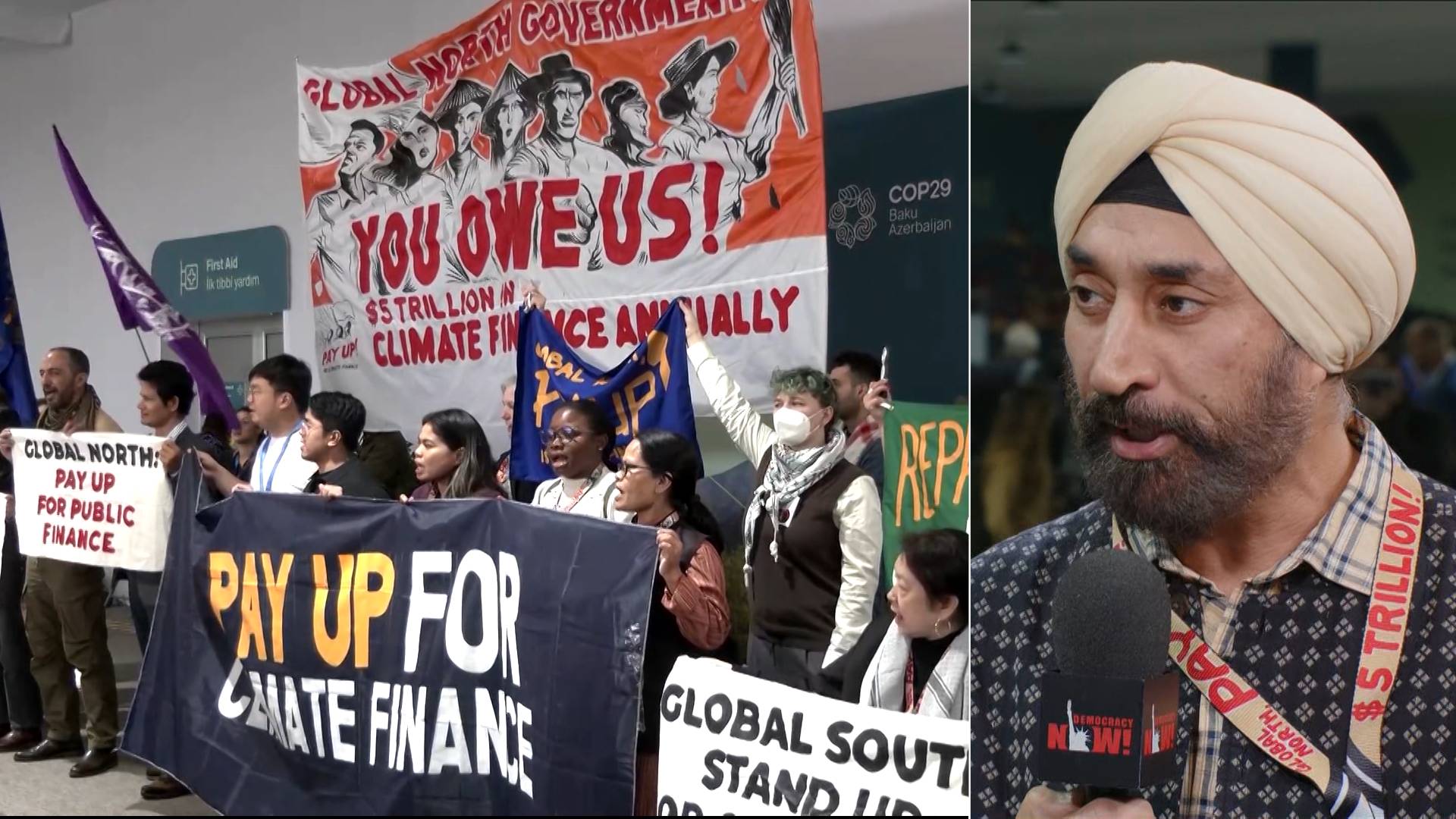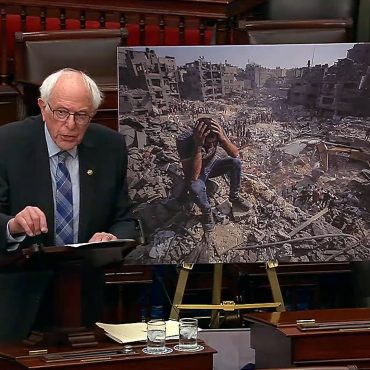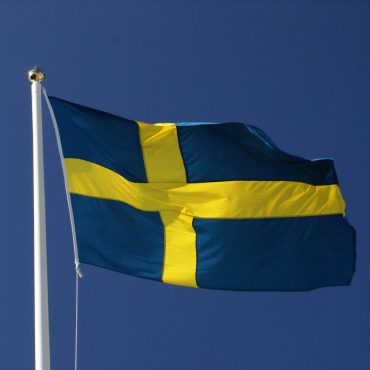This is a rush transcript. Copy may not be in its final form.
AMY GOODMAN: This is Democracy Now!, democracynow.org. I’m Amy Goodman, with Nermeen Shaikh. We’re broadcasting from the U.N. climate summit in Baku, Azerbaijan, joined for more on the latest by Harjeet Singh, global engagement director with the Fossil Fuel Non-Proliferation Treaty, co-founder of Satat Sampada, a social impact group. He’s from New Delhi, India.
How much effect can you have here, Harjeet? You’ve been to many of these COPs. They are getting, outside, I mean, in civil society, more and more repressive, last year in the UAE, here both from outside, the pressure of the state, but even inside. We have many people here — we’re going to talk to them in a few minutes — who have been wearing tape over their mouths that say “pay up.” Your response to what’s being released at this point, and what you want to see happen? You’re wearing — your lanyard says “pay up $5 trillion.”
HARJEET SINGH: That’s exactly what we need, and this is what civil society movement has been demanding, because that’s the money rich countries owe to developing countries for all the injustices that they have done to people around the world, particularly in the developing world, and you look at the climate crisis that we are facing.
I must say this is, to me, the most important COP, where finance has to be delivered, because we got Paris Agreement. The reality is that developing countries have put some ambitious plans on the table, be it transitioning away from fossil fuels or protecting their people from climate impacts. But there is no money available.
And can you imagine that after spending three years to agree on a new climate finance goal, we have had 14 meetings, several ministerials, and yet we have not seen any number coming from rich countries, and we have already spent 11 days here? At the penultimate day, rich countries are not revealing what commitment they are making to provide to this new climate finance goal, which is going to replace the $100 billion, which was quite a sham because what they provided was largely loans. So, nothing is going to move if we do not get an ambitious new climate finance goal, which must be in trillions of dollars annually.
NERMEEN SHAIKH: So, Harjeet, I want to ask you — I mean, you’re the head of the Fossil Fuel Non-Proliferation Treaty and a global engagement director for this treaty. What about the agreement that was reached last year at COP28 in Dubai, where commitments were made, or at least there was phrasing, to transition away from fossil fuels? There’s been an enormous amount of opposition to that in this year’s meeting, including from countries like Saudi Arabia and even Bolivia. So, where do those negotiations stand?
HARJEET SINGH: Nermeen, what happened at COP28 — and we all were there — it was historic. It wasn’t perfect, but for the first time, after 30 years, we could manage to get fossil fuels in a climate agreement and agreeing to transition away from fossil fuels. Of course, it was not perfect, because we had several, what we call, dangerous distractions or false solutions in the form of offsets and removals and even talking about nuclear. That wasn’t perfect. But at the same time, that was a step forward. And here, we have been struggling to get that on the agenda.
The reality is that developed countries are trying to pose themselves as climate leaders. They want a conversation on that, but back home they’re expanding fossil fuels. We all know countries like the U.S., U.K., Norway, Canada and Australia are going to be responsible for fossil fuel expansion between now and 2050. That’s more than 50% of the plans that they have put forward. That’s the reality. And the hypocrisy is, they want a discussion on it, but they don’t want to act upon it back home. And without providing any finance, they want developing countries like Colombia or Timor-Leste to move away from it. So, the core of the issue remains finance. Unless money is put on the table, the transitioning away from fossil fuels is not going to be a reality in developing countries.
NERMEEN SHAIKH: So, f you could explain already how much of — I mean, you know, Global South countries carry an enormous amount of debt. How much debt has been accumulated by developing countries or Global South countries that is through climate financing already?
HARJEET SINGH: Well, the —
NERMEEN SHAIKH: Because they’re loans and not grants, as you said.
HARJEET SINGH: Exactly. The number that rich countries claim to provide this time is about $112 billion. And their own admission is that 69% of that is loans. So, imagine that they’re actually increasing the loans on developing countries, adding to the debt crisis that they are already facing. And even now the conversation is that most of the money that’s going to be provided as part of the new climate finance goal is going to be either loans or investments. Very little money is being talked about in the form of grants. And that’s the question developing countries are asking. India has put forth a number that at least $600 billion annually must be in the form of grants.
And I must underline the point that when it comes to adaptation, which means preparing for climate impacts or recovering from disasters, you cannot expect poor communities and countries to borrow money, because that’s an additional cost that they have to pay. And when we talk about loss and damage, I had a house, I lost it, and then you’re asking me to take a loan for that.
AMY GOODMAN: So, let me ask you something. The Biden administration is going out. President Trump has been reelected. He wants to pull out of the Paris Climate Agreement. And you have many people saying, “Why should we have anything to do with any international organization? And why should the U.S. pay for you or anyone here, their countries, for their climate problems?”
HARJEET SINGH: Because the U.S. has caused the problem in the first place. U.S. is responsible for one-quarter of global greenhouse gas emissions cumulatively. And it has benefited most from that fossil fuel-based industrialization, and people in the country are enjoying the fruits of that. So, U.S., as a country, is liable to pay and, rather, the climate debt that they owe to developing countries. It’s their responsibility. It’s their obligation. And another quarter must come from European Union. That’s the reality. So, U.S. has to own up the responsibility and pay climate finance to developing countries for mitigation, adaptation and dealing with loss and damage.
NERMEEN SHAIKH: Harjeet, very quickly, you live in Delhi, which is now, today, the most polluted city in the world. Describe conditions there and why the situation is so bad that schools have been closed and the chief minister has called an emergency, a medical emergency.
HARJEET SINGH: Yes, it is. It is an emergency. But I would say it’s our own creation. It’s the same development model that India has adopted which the West has been promoting all over the world. And it’s the same fossil fuel-based development. There’s a lot of commonality between what’s happening in Delhi right now because of the high vehicular pollution, because of the industrial use of fossil fuels, and we are stuck with that system.
And the AQI is now more than 500. It’s a national emergency. My own daughter is studying from home because she’s not allowed to go to school. Schools are shut down. And our governments need to act. And I think the common part is: How do we move away from fossil fuels, which has caused the climate crisis, which is responsible for the pollution? And that environmental degradation that’s happening because of this model has to be questioned. So, while pollution remains a local issue, but at the heart of it is the fossil fuel-based development, which we must move away from.
AMY GOODMAN: Harjeet Singh is with us. He is with the Fossil Fuel Non-Proliferation Treaty coalition.











Post comments (0)